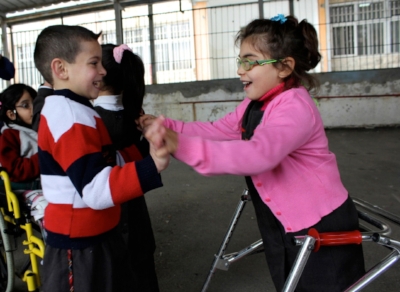Country Liaison for Iran, Maryam Sharifian, provides an overview of the status and challenges that exist to meet the learning needs of children with disabilities in Iran. Although, there is strong global support for inclusive education to help all children attend the same schools, it is not as popular as other countries in Iran.
Shifting Societal Awareness for Children With Disabilities
- Iran has experienced progress over the years in taking effective steps towards identifying people with disabilities and providing more supportive services for families’ welfare so that they may be encouraged to reveal a disability in their household.
- Many families still hide and conceal their children with disabilities which remains a challenge. Educating society about people with disabilities and students receiving special education services are important to build an inclusive community.
- According to the Ministry of Education, 10 percent of children’s population in Iran are children with special needs, but this is believed to be underreported despite steps and services taken to improve identifying people with disabilities.
Providing Support Services in Iran
- Iran’s Ministry of Education, Exceptional Education Organization is divided into seven categories including visual impairment, hearing impairment, physical disability, behavioral disorders, learning disorder, mental impairment, and multiple disability.
- Donors are a major provider of special education schools in Iran. Of the 1,570 special education schools in the country, 180 were made by donors, according to Majid Ghadami, head of the Exceptional Education Organization.
- Many challenges in special education remain in Iran. There is a major problem with a shortage of educated and trained teachers at schools and specially for children with autism; lack of transportation makes it difficult for families to send their children to schools; and overall, inclusive education is not accessible in Iran. Public schools do not welcome children with special needs. They believe a high-quality classroom requires students with the same and/or higher learning abilities.
- Public schools also report that parents complain if there is any student with special needs in their children’s classroom. Children with special needs are negatively stigmatized in Iran and are often still regarded as “retarded.”
- As noted earlier, there has been much progress in addressing children with special needs. As the global community continues to support improved services and inclusion policies, it is hoped that Iran will follow best practices.
Reference
https://www.mehrnews.com/news/4182250/۱۳۷-هزار-دانش-آموز-استثنایی-در-کشور-داریم-مشکلات-شیوه-تلفیقی
Disclaimer: The information provided by the Country Liaison represents their perspective on education progress and challenges in their nation. It does not necessarily reflect the point of view of the Association for Childhood Education International staff and leadership.

